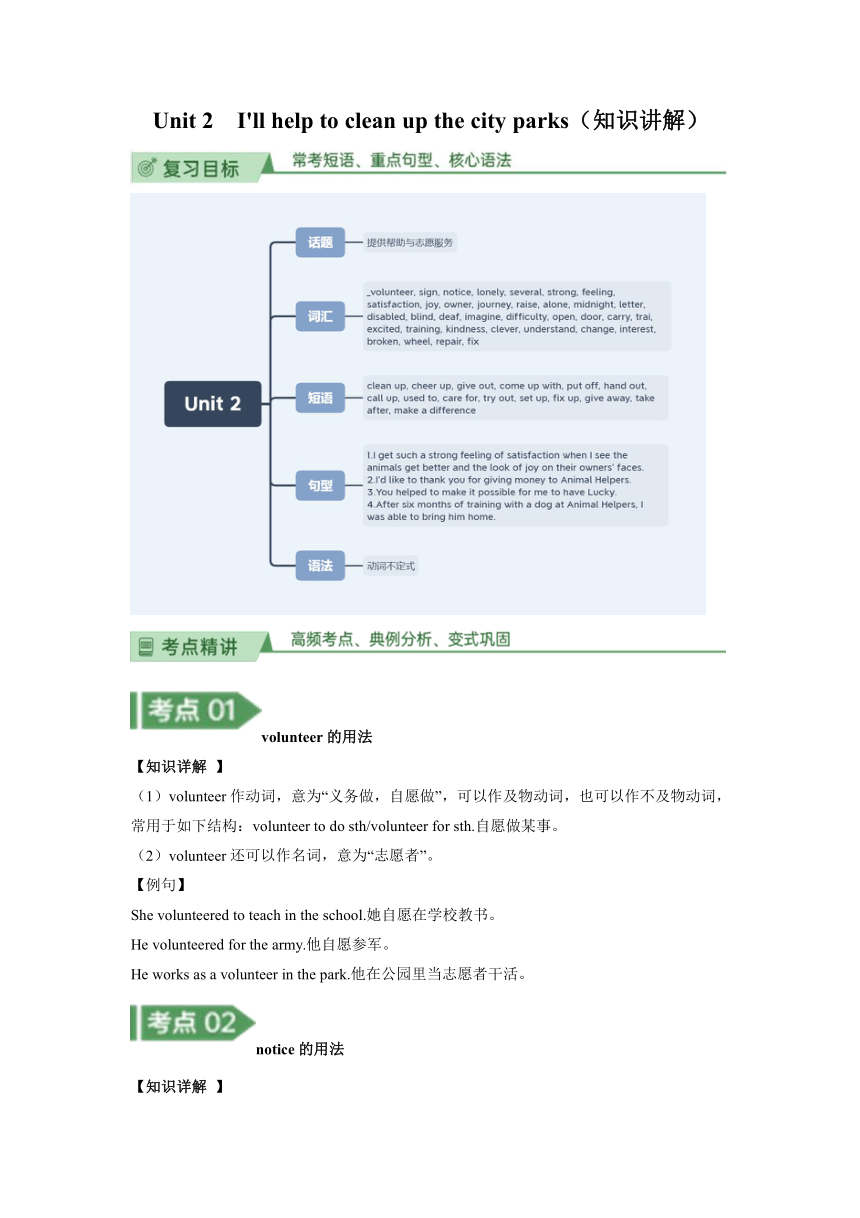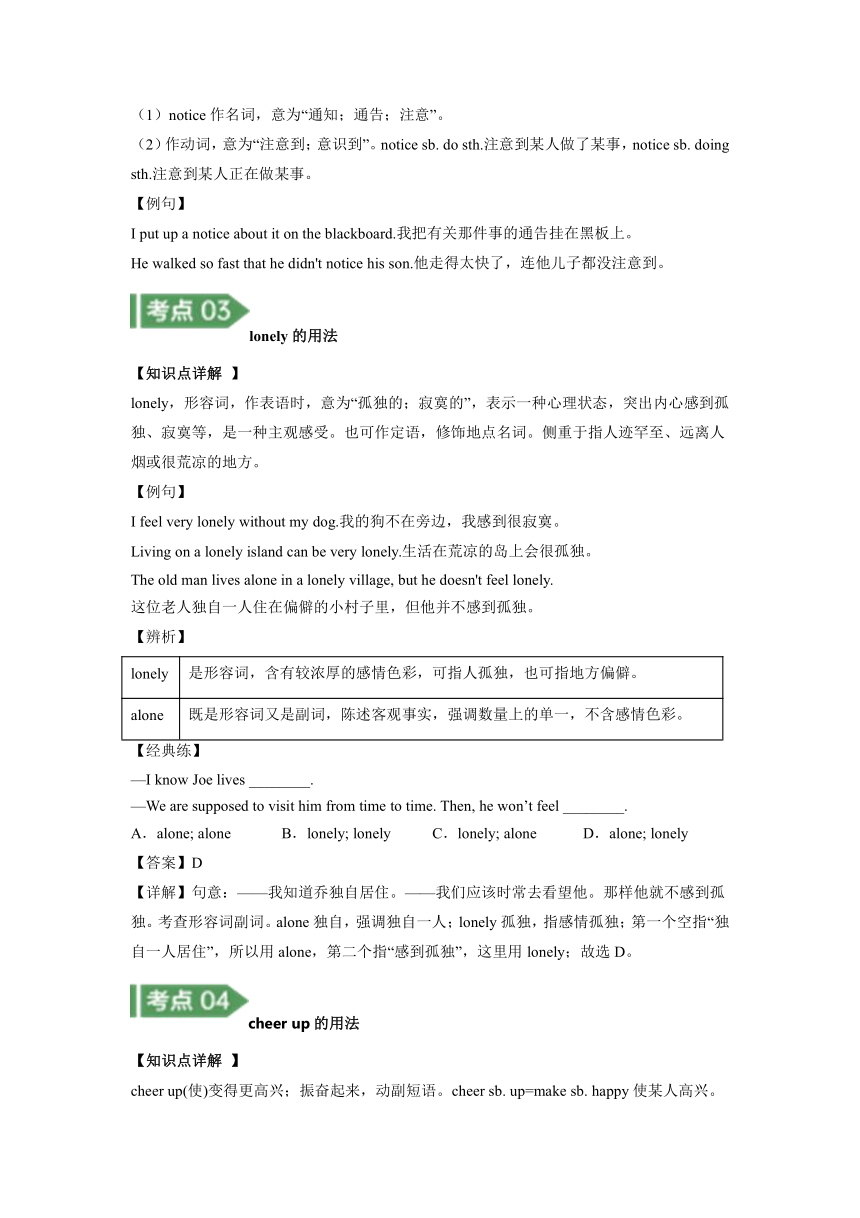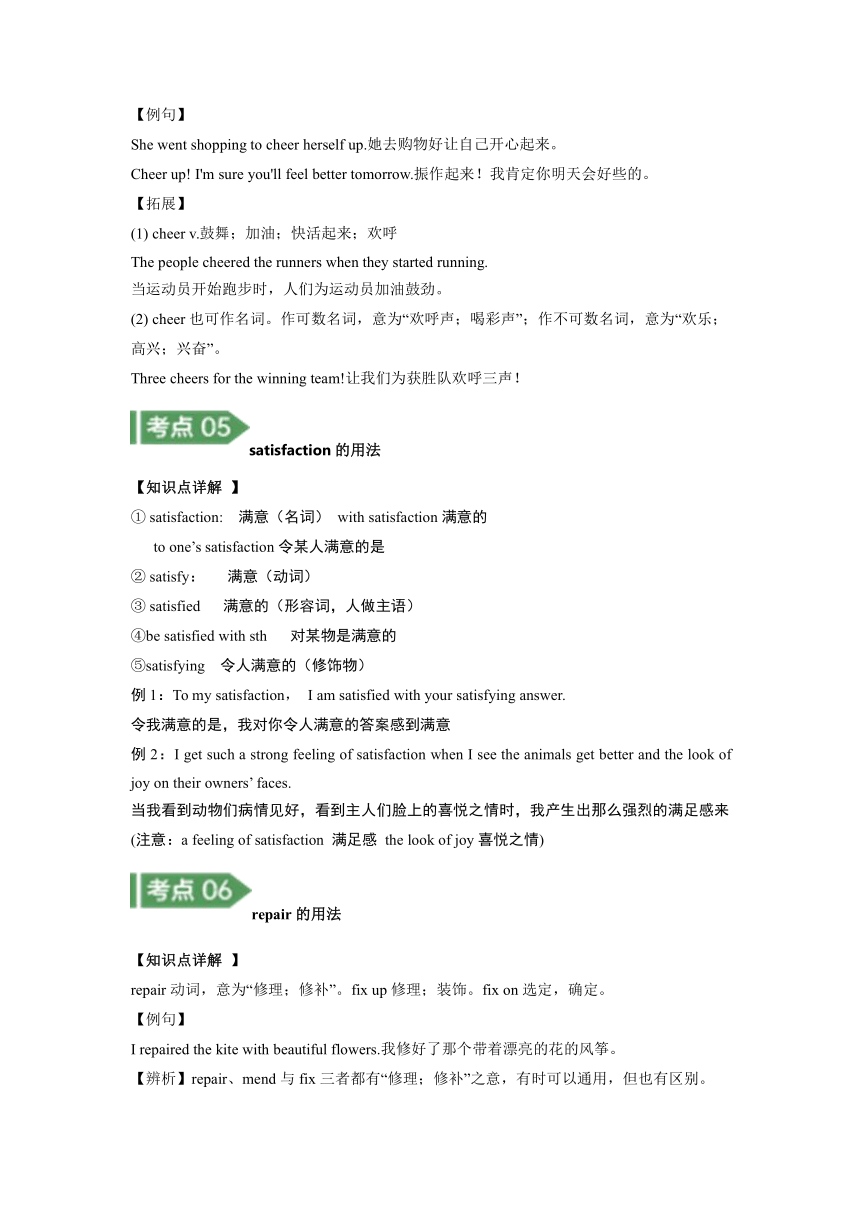Unit 2 知识讲解--2022-2023学年度八年级英语下册基础知识专项讲练(人教版)
文档属性
| 名称 | Unit 2 知识讲解--2022-2023学年度八年级英语下册基础知识专项讲练(人教版) |

|
|
| 格式 | docx | ||
| 文件大小 | 356.8KB | ||
| 资源类型 | 教案 | ||
| 版本资源 | 人教新目标(Go for it)版 | ||
| 科目 | 英语 | ||
| 更新时间 | 2023-05-04 00:00:00 | ||
图片预览



文档简介
Unit 2 I'll help to clean up the city parks(知识讲解)
volunteer的用法
【知识详解 】
(1)volunteer作动词,意为“义务做,自愿做”,可以作及物动词,也可以作不及物动词,常用于如下结构:volunteer to do sth/volunteer for sth.自愿做某事。
(2)volunteer还可以作名词,意为“志愿者”。
【例句】
She volunteered to teach in the school.她自愿在学校教书。
He volunteered for the army.他自愿参军。
He works as a volunteer in the park.他在公园里当志愿者干活。
notice的用法
【知识详解 】
notice作名词,意为“通知;通告;注意”。
(2)作动词,意为“注意到;意识到”。notice sb. do sth.注意到某人做了某事,notice sb. doing sth.注意到某人正在做某事。
【例句】
I put up a notice about it on the blackboard.我把有关那件事的通告挂在黑板上。
He walked so fast that he didn't notice his son.他走得太快了,连他儿子都没注意到。
lonely的用法
【知识点详解 】
lonely,形容词,作表语时,意为“孤独的;寂寞的”,表示一种心理状态,突出内心感到孤独、寂寞等,是一种主观感受。也可作定语,修饰地点名词。侧重于指人迹罕至、远离人烟或很荒凉的地方。
【例句】
I feel very lonely without my dog.我的狗不在旁边,我感到很寂寞。
Living on a lonely island can be very lonely.生活在荒凉的岛上会很孤独。
The old man lives alone in a lonely village, but he doesn't feel lonely.
这位老人独自一人住在偏僻的小村子里,但他并不感到孤独。
【辨析】
lonely 是形容词,含有较浓厚的感彩,可指人孤独,也可指地方偏僻。
alone 既是形容词又是副词,陈述客观事实,强调数量上的单一,不含感彩。
【经典练】
—I know Joe lives ________.
—We are supposed to visit him from time to time. Then, he won’t feel ________.
A.alone; alone B.lonely; lonely C.lonely; alone D.alone; lonely
【答案】D
【详解】句意:——我知道乔独自居住。——我们应该时常去看望他。那样他就不感到孤独。考查形容词副词。alone独自,强调独自一人;lonely孤独,指感情孤独;第一个空指“独自一人居住”,所以用alone,第二个指“感到孤独”,这里用lonely;故选D。
cheer up的用法
【知识点详解 】
cheer up(使)变得更高兴;振奋起来,动副短语。cheer sb. up=make sb. happy使某人高兴。
【例句】
She went shopping to cheer herself up.她去购物好让自己开心起来。
Cheer up! I'm sure you'll feel better tomorrow.振作起来!我肯定你明天会好些的。
【拓展】
(1) cheer v.鼓舞;加油;快活起来;欢呼
The people cheered the runners when they started running.
当运动员开始跑步时,人们为运动员加油鼓劲。
(2) cheer也可作名词。作可数名词,意为“欢呼声;喝彩声”;作不可数名词,意为“欢乐;高兴;兴奋”。
Three cheers for the winning team!让我们为获胜队欢呼三声!
satisfaction的用法
【知识点详解 】
① satisfaction: 满意(名词) with satisfaction满意的
to one’s satisfaction令某人满意的是
② satisfy: 满意(动词)
③ satisfied 满意的(形容词,人做主语)
④be satisfied with sth 对某物是满意的
⑤satisfying 令人满意的(修饰物)
例1:To my satisfaction, I am satisfied with your satisfying answer.
令我满意的是,我对你令人满意的答案感到满意
例2:I get such a strong feeling of satisfaction when I see the animals get better and the look of joy on their owners’ faces.
当我看到动物们病情见好,看到主人们脸上的喜悦之情时,我产生出那么强烈的满足感来(注意:a feeling of satisfaction 满足感 the look of joy喜悦之情)
repair的用法
【知识点详解 】
repair动词,意为“修理;修补”。fix up修理;装饰。fix on选定,确定。
【例句】
I repaired the kite with beautiful flowers.我修好了那个带着漂亮的花的风筝。
【辨析】repair、mend与fix三者都有“修理;修补”之意,有时可以通用,但也有区别。
repair 对象范围很广,从房屋、道路到日常生活必需品,使受到一定损失或失灵的东西恢复其形状或功能。
mend 意思是恢复某物体原来的样子(包括用针、线来缝补)。一般指较小之物,像鞋子、窗子等。
fix 用于需要重新“调”物体的结构,把松散的部件固定结实,将分离的物体各部分装配起来。
Who has repaired the broken leg of the table 谁把桌子的断腿修好了
This shirt is too old to mend. 这件衣服太旧,不能补了。
Can you fix the broken chair 你能修理那把坏了的椅子吗
imagine的用法
【知识点详解 】
imagine v.想象;设想。既可作及物动词,也可作不及物动词,后接名词、代词、动名词或宾语从句。
①imagine doing…想象去做……;
类似词组:give up doing sth放弃做某事
enjoy doing sth喜欢做某事 regret doing sth后悔做某事keep doing sth持续做某事
put off doing sth推迟做某事 finish doing sth完成做某事 mind doing sth介意做某事
practice doing sth练习做某事
②imagine sb. doing…想象某人做……;
③imagine + that从句/wh-从句 想象……;料想……(◆不可用于进行时)。
【例句】
Imagine you can’t walk or use your hands easily. 想象你不能走或手不能灵活运用。
I imagine(that) you are very tired. 我猜想你很累了。
carry的用法
【知识点详解 】
carry动词,意为“拿;提;扛”。
常见短语:
carry on继续下去;carry out开展,执行;carry through完成,渡过难关;carry over(在不同情况下)继续存在
【例句】
He was carrying a box on his shoulder.他正扛着个盒子。
The woman carried her baby in her arms.妇女怀抱着孩子。
【辨析】carry、bring、take、fetch与get
carry 指“随身携带(不说明固定方向)”,有时含有“负担”的意思。
bring 指“从别处把东西或人带来、拿来”。
take 指“把东西带走或拿走”。
fetch 指“到别处去把某人或某物带来或拿来”。
get 是常用词,多用于口语,与fetch同义。
He brought a new book with him.他带来一本新书。
Please take the letter to the post office.请把这封信送到邮局去。
I asked her to fetch me an evening paper.我求她去给我拿一张晚报来。
Go and get some water.去打些水来。
interest的用法
【知识点详解 】
、interest作“兴趣”讲时,既可作可数名词,也可作不可数名词。
①、interest作不可数名词,常用短语有:show/have/take(an) interest in(doing) sth.对……有兴趣;find/feel interest in sth./in doing sth.在某方面培养/有兴趣;lose interest in sth./in doing sth.在某方面失去兴趣。
②、interest意为“业余爱好”或“感兴趣的事”时,常作可数名词。
(2)、 interest作动词时是及物动词,interest sb.意为“使某人感兴趣;引起某人注意”。
【例句】
She showed great interest in the meeting.她对这次会议表现出极大的兴趣。
He has two interests. One is sports and the other is music.他有两个爱好:一个是体育,另一个是音乐。
Geography doesn't interest him.地理引不起他的兴趣。
take after的用法
【知识点详解】
take after(外貌或行为)像,指由于血缘关系而在外貌、行为等方面相似,其中after是介词,其后常接名词或代词,相当于be similar to。(look like意为“看上去像”,多指外貌方面;be like意为“像”,可指外貌,也可指性格方面。)不能用于进行时。
【例句】
Your daughter doesn’t take after you at all.你的女儿长得一点都不像你。try的用法
【知识点详解】
① try out for 为···参加选拔
② try on试穿
③ try doing sth试着干某事
④ try to do sth努力去做某事
⑤ try my best to do sth尽我最大努力去干某事
例句:Last year , she decided to try out for a volunteer after-school reading program.
去年,他决定去参加一个课外阅读活动的志愿者活动
come up with
【知识点详解】
① come up with 想出来=think up
② come out: 开花; 出版; 出来
③ come on加油!
④come in进来
⑤come over顺便来访
例1:We need to come up with a plan for it。
我们需要为它想出计划
例2:Our class is trying to come up with some ideas to cheer up sick children because they are often sad.
我们班正在努力想出一些主意让生病的孩子高兴起来,因为她们经常难过。
例3:The ideas that he came up with worked out fine.
他想出的这些方法很有效(注意:work out fine=work out well奏效)
put off推迟
【知识点详解】
put off推迟,后跟动词的-ing形式,意为“推迟做……”。
【例句】
They put off the game because of rain.他们因雨推迟了比赛。
The fireman put off going home because of his work.消防员由于工作原因推迟回家了。
【拓展】
含put的动词短语
put away放好;整理好
put up举起;张贴;挂起
put on穿上;戴上;上演
put out熄灭
change的用法
【知识点详解】
(1) change ① 改变(动词) ②改变(名词) ③零钱(不可数名词)
(2) change one’s mind改变某人的主意
(3) change one’s life改变某人的生活
(4) change·· into··把···变成···
例句:Thank you again for changing my life.
再次谢谢你改变了我的生活。
volunteer的用法
【知识详解 】
(1)volunteer作动词,意为“义务做,自愿做”,可以作及物动词,也可以作不及物动词,常用于如下结构:volunteer to do sth/volunteer for sth.自愿做某事。
(2)volunteer还可以作名词,意为“志愿者”。
【例句】
She volunteered to teach in the school.她自愿在学校教书。
He volunteered for the army.他自愿参军。
He works as a volunteer in the park.他在公园里当志愿者干活。
notice的用法
【知识详解 】
notice作名词,意为“通知;通告;注意”。
(2)作动词,意为“注意到;意识到”。notice sb. do sth.注意到某人做了某事,notice sb. doing sth.注意到某人正在做某事。
【例句】
I put up a notice about it on the blackboard.我把有关那件事的通告挂在黑板上。
He walked so fast that he didn't notice his son.他走得太快了,连他儿子都没注意到。
lonely的用法
【知识点详解 】
lonely,形容词,作表语时,意为“孤独的;寂寞的”,表示一种心理状态,突出内心感到孤独、寂寞等,是一种主观感受。也可作定语,修饰地点名词。侧重于指人迹罕至、远离人烟或很荒凉的地方。
【例句】
I feel very lonely without my dog.我的狗不在旁边,我感到很寂寞。
Living on a lonely island can be very lonely.生活在荒凉的岛上会很孤独。
The old man lives alone in a lonely village, but he doesn't feel lonely.
这位老人独自一人住在偏僻的小村子里,但他并不感到孤独。
【辨析】
lonely 是形容词,含有较浓厚的感彩,可指人孤独,也可指地方偏僻。
alone 既是形容词又是副词,陈述客观事实,强调数量上的单一,不含感彩。
【经典练】
—I know Joe lives ________.
—We are supposed to visit him from time to time. Then, he won’t feel ________.
A.alone; alone B.lonely; lonely C.lonely; alone D.alone; lonely
【答案】D
【详解】句意:——我知道乔独自居住。——我们应该时常去看望他。那样他就不感到孤独。考查形容词副词。alone独自,强调独自一人;lonely孤独,指感情孤独;第一个空指“独自一人居住”,所以用alone,第二个指“感到孤独”,这里用lonely;故选D。
cheer up的用法
【知识点详解 】
cheer up(使)变得更高兴;振奋起来,动副短语。cheer sb. up=make sb. happy使某人高兴。
【例句】
She went shopping to cheer herself up.她去购物好让自己开心起来。
Cheer up! I'm sure you'll feel better tomorrow.振作起来!我肯定你明天会好些的。
【拓展】
(1) cheer v.鼓舞;加油;快活起来;欢呼
The people cheered the runners when they started running.
当运动员开始跑步时,人们为运动员加油鼓劲。
(2) cheer也可作名词。作可数名词,意为“欢呼声;喝彩声”;作不可数名词,意为“欢乐;高兴;兴奋”。
Three cheers for the winning team!让我们为获胜队欢呼三声!
satisfaction的用法
【知识点详解 】
① satisfaction: 满意(名词) with satisfaction满意的
to one’s satisfaction令某人满意的是
② satisfy: 满意(动词)
③ satisfied 满意的(形容词,人做主语)
④be satisfied with sth 对某物是满意的
⑤satisfying 令人满意的(修饰物)
例1:To my satisfaction, I am satisfied with your satisfying answer.
令我满意的是,我对你令人满意的答案感到满意
例2:I get such a strong feeling of satisfaction when I see the animals get better and the look of joy on their owners’ faces.
当我看到动物们病情见好,看到主人们脸上的喜悦之情时,我产生出那么强烈的满足感来(注意:a feeling of satisfaction 满足感 the look of joy喜悦之情)
repair的用法
【知识点详解 】
repair动词,意为“修理;修补”。fix up修理;装饰。fix on选定,确定。
【例句】
I repaired the kite with beautiful flowers.我修好了那个带着漂亮的花的风筝。
【辨析】repair、mend与fix三者都有“修理;修补”之意,有时可以通用,但也有区别。
repair 对象范围很广,从房屋、道路到日常生活必需品,使受到一定损失或失灵的东西恢复其形状或功能。
mend 意思是恢复某物体原来的样子(包括用针、线来缝补)。一般指较小之物,像鞋子、窗子等。
fix 用于需要重新“调”物体的结构,把松散的部件固定结实,将分离的物体各部分装配起来。
Who has repaired the broken leg of the table 谁把桌子的断腿修好了
This shirt is too old to mend. 这件衣服太旧,不能补了。
Can you fix the broken chair 你能修理那把坏了的椅子吗
imagine的用法
【知识点详解 】
imagine v.想象;设想。既可作及物动词,也可作不及物动词,后接名词、代词、动名词或宾语从句。
①imagine doing…想象去做……;
类似词组:give up doing sth放弃做某事
enjoy doing sth喜欢做某事 regret doing sth后悔做某事keep doing sth持续做某事
put off doing sth推迟做某事 finish doing sth完成做某事 mind doing sth介意做某事
practice doing sth练习做某事
②imagine sb. doing…想象某人做……;
③imagine + that从句/wh-从句 想象……;料想……(◆不可用于进行时)。
【例句】
Imagine you can’t walk or use your hands easily. 想象你不能走或手不能灵活运用。
I imagine(that) you are very tired. 我猜想你很累了。
carry的用法
【知识点详解 】
carry动词,意为“拿;提;扛”。
常见短语:
carry on继续下去;carry out开展,执行;carry through完成,渡过难关;carry over(在不同情况下)继续存在
【例句】
He was carrying a box on his shoulder.他正扛着个盒子。
The woman carried her baby in her arms.妇女怀抱着孩子。
【辨析】carry、bring、take、fetch与get
carry 指“随身携带(不说明固定方向)”,有时含有“负担”的意思。
bring 指“从别处把东西或人带来、拿来”。
take 指“把东西带走或拿走”。
fetch 指“到别处去把某人或某物带来或拿来”。
get 是常用词,多用于口语,与fetch同义。
He brought a new book with him.他带来一本新书。
Please take the letter to the post office.请把这封信送到邮局去。
I asked her to fetch me an evening paper.我求她去给我拿一张晚报来。
Go and get some water.去打些水来。
interest的用法
【知识点详解 】
、interest作“兴趣”讲时,既可作可数名词,也可作不可数名词。
①、interest作不可数名词,常用短语有:show/have/take(an) interest in(doing) sth.对……有兴趣;find/feel interest in sth./in doing sth.在某方面培养/有兴趣;lose interest in sth./in doing sth.在某方面失去兴趣。
②、interest意为“业余爱好”或“感兴趣的事”时,常作可数名词。
(2)、 interest作动词时是及物动词,interest sb.意为“使某人感兴趣;引起某人注意”。
【例句】
She showed great interest in the meeting.她对这次会议表现出极大的兴趣。
He has two interests. One is sports and the other is music.他有两个爱好:一个是体育,另一个是音乐。
Geography doesn't interest him.地理引不起他的兴趣。
take after的用法
【知识点详解】
take after(外貌或行为)像,指由于血缘关系而在外貌、行为等方面相似,其中after是介词,其后常接名词或代词,相当于be similar to。(look like意为“看上去像”,多指外貌方面;be like意为“像”,可指外貌,也可指性格方面。)不能用于进行时。
【例句】
Your daughter doesn’t take after you at all.你的女儿长得一点都不像你。try的用法
【知识点详解】
① try out for 为···参加选拔
② try on试穿
③ try doing sth试着干某事
④ try to do sth努力去做某事
⑤ try my best to do sth尽我最大努力去干某事
例句:Last year , she decided to try out for a volunteer after-school reading program.
去年,他决定去参加一个课外阅读活动的志愿者活动
come up with
【知识点详解】
① come up with 想出来=think up
② come out: 开花; 出版; 出来
③ come on加油!
④come in进来
⑤come over顺便来访
例1:We need to come up with a plan for it。
我们需要为它想出计划
例2:Our class is trying to come up with some ideas to cheer up sick children because they are often sad.
我们班正在努力想出一些主意让生病的孩子高兴起来,因为她们经常难过。
例3:The ideas that he came up with worked out fine.
他想出的这些方法很有效(注意:work out fine=work out well奏效)
put off推迟
【知识点详解】
put off推迟,后跟动词的-ing形式,意为“推迟做……”。
【例句】
They put off the game because of rain.他们因雨推迟了比赛。
The fireman put off going home because of his work.消防员由于工作原因推迟回家了。
【拓展】
含put的动词短语
put away放好;整理好
put up举起;张贴;挂起
put on穿上;戴上;上演
put out熄灭
change的用法
【知识点详解】
(1) change ① 改变(动词) ②改变(名词) ③零钱(不可数名词)
(2) change one’s mind改变某人的主意
(3) change one’s life改变某人的生活
(4) change·· into··把···变成···
例句:Thank you again for changing my life.
再次谢谢你改变了我的生活。
同课章节目录
- Unit 1 What's the matter?
- Section A
- Section B
- Unit 2 I'll help to clean up the city parks.
- Section A
- Section B
- Unit 3 Could you please clean your room?
- Section A
- Section B
- Unit 4 Why don't you talk to your parents?
- Section A
- Section B
- Unit 5 What were you doing when the rainstorm came
- Section A
- Section B
- Review of Units 1-5
- Unit 6 An old man tried to move the mountains.
- Section A
- Section B
- Unit 7 What's the highest mountain in the world?
- Section A
- Section B
- Unit 8 Have you read Treasure Island yet?
- Section A
- Section B
- Unit 9 Have you ever been to a museum?
- Section A
- Section B
- Unit 10 I've had this bike for three years.
- Section A
- Section B
